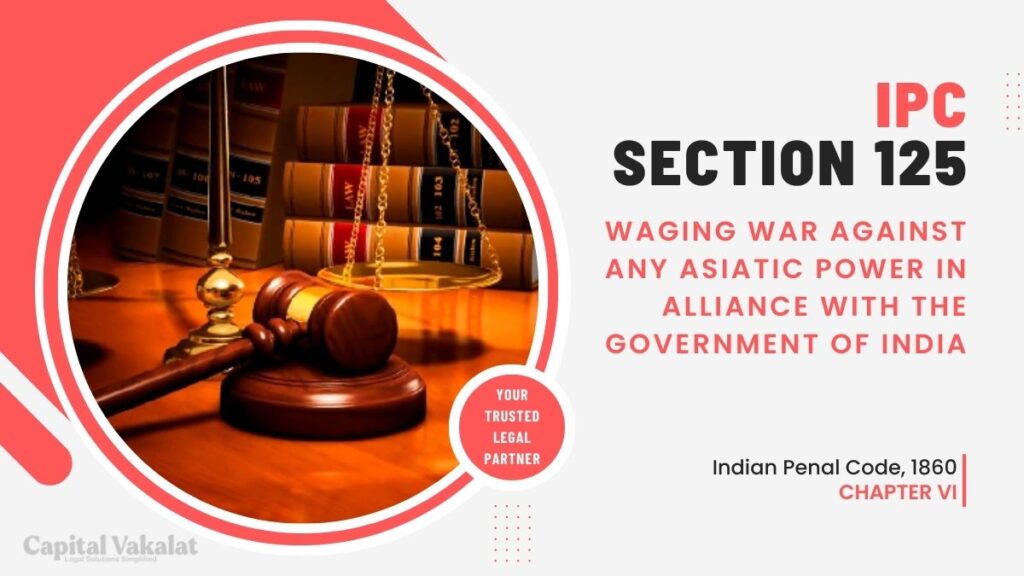Section 125 of the Indian Penal Code (IPC) is a legal provision that addresses a rather unique offense. It pertains to “Waging War against any Asiatic Power in alliance with the Government of India.”

In this article, we will delve into the historical context, the legal framework of this section, its significance, and its implications in the modern context.
Understanding the Historical Context
To comprehend Section 125 IPC, we must first understand the historical backdrop that gave rise to such a provision. During the colonial era, India was often under the rule of foreign powers, both European and Asiatic. To protect its interests, the British Raj enacted laws to curb any activities that might threaten their dominion. Section 125 was one such measure.
The Legal Framework: Section 125 IPC
Section 125 IPC consists of three key components – “Waging War,” “Against Any Asiatic Power,” and “In Alliance with the Government of India.”
a. Waging War
The offense of waging war is a grave one. It involves actions that are not merely acts of aggression but a deliberate attempt to engage in hostilities. This could encompass various activities, from incitement to actual acts of warfare.
b. Against Any Asiatic Power
This part of the section specifies that the war must be directed against an Asiatic power. This is an essential qualifier and underscores the historical context of the law.
c. In Alliance with the Government of India
The offense is complete when the war is waged against an Asiatic power in alliance with the Government of India. This element emphasizes the need for a direct threat to the Indian government’s interests.
Significance of Section 125 IPC
Section 125 IPC is significant as it embodies a historical perspective, reflecting the colonial era’s concerns. It illustrates the British Raj’s determination to protect its alliances and interests in Asia, especially during a time of growing anti-colonial sentiment.
Historical Cases
Several historical cases stand out where this provision was invoked. The most notable was during the First War of Independence in 1857, often referred to as the Sepoy Mutiny, when this section was used against Indian rebels.
Modern Interpretations
In the modern context, Section 125 IPC is rarely applied but still exists in the legal framework. It has largely become a symbolic provision, representing a bygone era.
Waging War: A Complex Offense
The offense of waging war is complex. Proving the intent to wage war, especially against an Asiatic power in alliance with the Government of India, can be challenging. It requires substantial evidence and a clear motive.
The Role of Intent
Intent plays a crucial role in establishing guilt under this section. The prosecution must demonstrate that the accused had a deliberate intention to wage war against an Asiatic power that posed a threat to the Government of India.
Punishments and Penalties
The penalties for violating Section 125 IPC are severe, including imprisonment for life. This underscores the gravity of the offense.
Critiques and Controversies
Over the years, Section 125 IPC has faced criticism for its colonial origins and the rarity of its application. Critics argue that it is an anachronistic provision that should be repealed.
Amendments to Section 125 IPC
There have been discussions about amending or repealing Section 125 IPC, but it remains a part of Indian law as of now.
International Relations
Section 125 IPC also highlights the importance of international relations and the protection of alliances. In a globalized world, this legal provision serves as a reminder of India’s historical diplomatic commitments.
Conclusion
In conclusion, Section 125 IPC reflects a bygone era when India was under colonial rule. It serves as a historical relic that still exists in India’s legal framework, reminding us of the country’s complex history.
FAQs
What was the historical context of Section 125 IPC’s enactment?
Section 125 IPC was enacted during the colonial era when India was under British rule. It was designed to protect British interests and alliances in Asia.
Can individuals be charged under Section 125 IPC today?
While it is theoretically possible, the application of this section is exceedingly rare in contemporary legal proceedings.
What is the punishment for violating Section 125 IPC?
Violating Section 125 IPC can result in severe penalties, including imprisonment for life.
Is there any movement to amend or repeal Section 125 IPC?
There have been discussions about amending or repealing this section, but as of now, it remains a part of the Indian legal system.